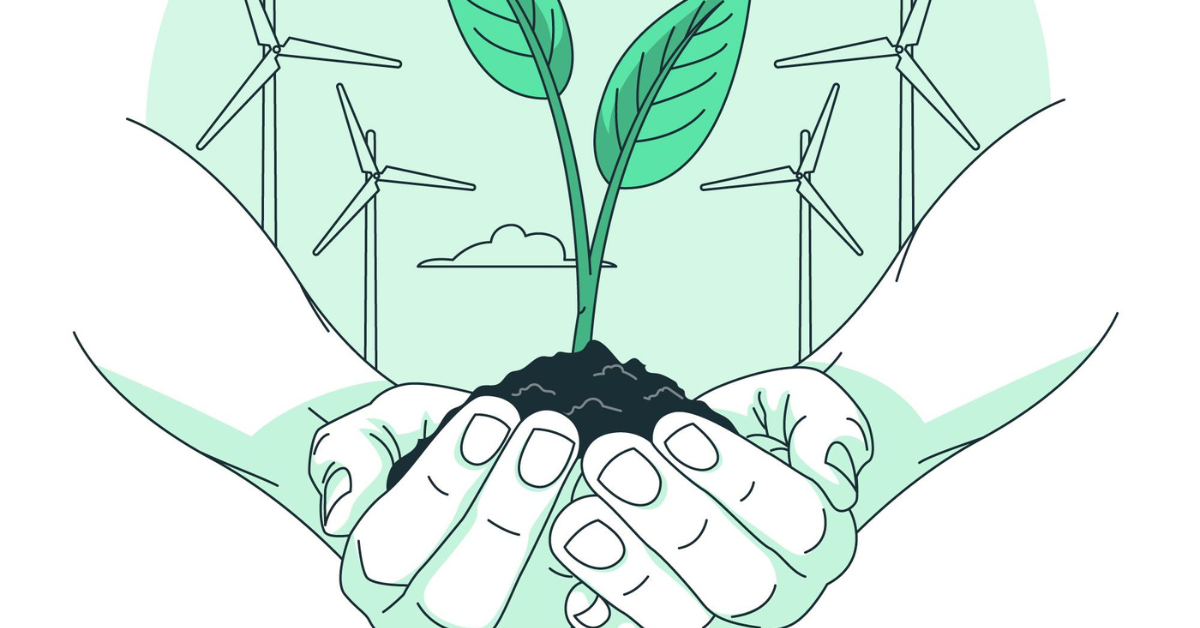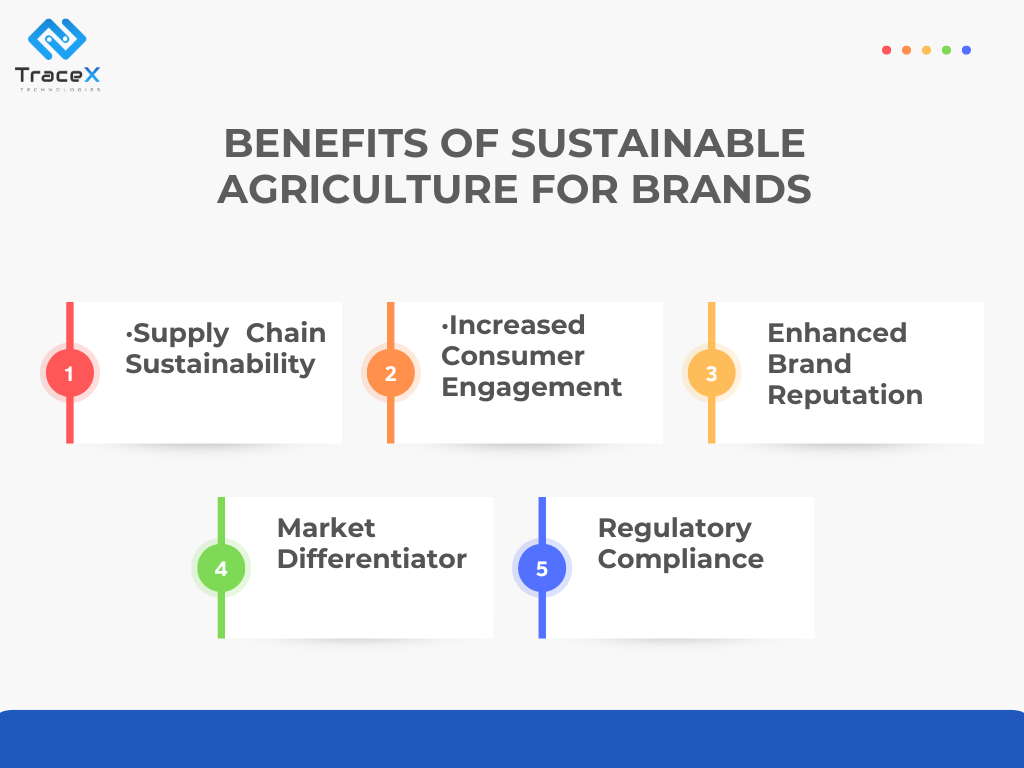Contact: +91 99725 24322 |
Menu
Menu
Quick summary: Discover the transformative power of sustainable agriculture in building future-proof brands. Learn how sustainable practices, traceability solutions, and a commitment to environmental stewardship can drive growth, enhance brand reputation, and create a more resilient food system. Explore the opportunities for innovation, sustainability, and profitability in agriculture as we shape a brighter future for both businesses and the planet

Sustainable agriculture not only addresses the urgent need for food security but also promotes responsible land management, biodiversity conservation and climate resilience. At the heart of sustainable agriculture lies a powerful transformation, one that goes beyond traditional farming practices and embraces innovative approaches that balance economic viability, social equity and environmental stewardship.
This transformative journey is paving the way for future brands in the agriculture sector in line with the UN Sustainable Development Goals, brands that are not only successful in the market but are also champions of sustainability and long-term resilience.
A report by the World Wildlife Fund (WWF) estimates that sustainable agriculture practices could increase crop yields by 30% while reducing water usage by 50% and chemical inputs by 70%.
Sustainable agriculture is necessary to protect the environment, ensure food security, mitigate climate change promote human health and build economic resilience. Transitioning to sustainable practices helps to create a more resilient and equitable agriculture system that meets the need of the present while protecting the needs of future generations.
Conventional agriculture practices lead to environmental degradation, soil erosion, water pollution and biodiversity loss. Sustainable agriculture focuses on preserving natural resources, protecting ecosystems and minimizing negative impacts on the environment. This is possible through organic farming, agroforestry and conservation tillage.
Ensuring food security is a challenge with the global population expected to reach 10 billion by 2050. Sustainable agriculture promotes resilient and diverse farming systems that enhance soil fertility, conserve water resources and reduce reliance on synthetic inputs. This contributes to improved crop yields, enhanced food production and contributes to global food security.
Agriculture is a significant contributor to greenhouse gas emissions due to deforestation, livestock production and synthetic fertilizer use. Sustainable agriculture practices like carbon sequestration through agroforestry and regenerative farming can help mitigate climate change by reducing emissions and enhancing carbon storage in soils.
By promoting organic farming, diversifying crop rotations and adopting integrated pest management, sustainable agriculture contributes to healthier food options for consumers.
Sustainable agriculture offers economic benefits by diversifying income streams, reducing input costs and enhancing long-term productivity. Farmers can increase their resilience to market fluctuations and reduce financial risks.
In today’s marketplace, consumers are increasingly making conscious choices. They’re looking for products that not only meet their needs but are also produced responsibly, with a minimal environmental impact and a commitment to social well-being. Sustainable agriculture practices are no longer a niche concern; they are a strategic advantage for brands looking to build and maintain success.
The demand for sustainable products is surging. Studies show that a significant portion of consumers are willing to pay a premium for eco-friendly options. By adopting sustainable agricultural practices, your brand can cater to this growing market segment.
Consumers are becoming more aware of the environmental and social impacts of their purchasing decisions. By demonstrating a commitment to sustainable agriculture, your brand positions itself as a responsible and environmentally conscious entity. This enhances your reputation and fosters a positive brand image among environmentally conscious consumers.
Transparency in sourcing practices is crucial for building trust with consumers. When you embrace sustainable agriculture, you demonstrate a willingness to be transparent about your supply chain and the origins of your products. This transparency fosters trust and loyalty among consumers who value ethical and sustainable practices.
The future of agriculture leans heavily on sustainable practices. Climate change, resource depletion, and evolving consumer preferences make it clear that unsustainable methods are not viable in the long term. By embracing sustainable agriculture now, your brand is not just meeting current demands, but also investing in a future-proof business model that can thrive in the changing landscape.
Imagine a coffee brand that partners with smallholder farmers who utilize regenerative agriculture practices. This not only protects biodiversity but also improves coffee quality. The brand can then clearly communicate this on their packaging and marketing materials, appealing to environmentally conscious consumers and building trust through transparency.
Similarly, a clothing brand that sources cotton from farms practicing regenerative agriculture can showcase their commitment to soil health and reduced water usage. This resonates with consumers looking for brands that prioritize environmental well-being.
Sustainable agriculture is not just about environmental responsibility; it’s a strategic decision that can significantly benefit your brand. By meeting consumer demand, enhancing your reputation, building trust, and future-proofing your business, you can leverage sustainable practices to build a successful and sustainable brand in the long term.
Agriculture is sustainable when it articulates one or more of the UN’s pillars for sustainable development in the environmental, social, and economic spheres.
Here we present some examples of sustainable agricultural practices and the brands that are working towards sustainable agriculture.
Organic farming eliminates the use of synthetic pesticides, fertilizers and GMOs. It focuses on soil health, biodiversity conservation and ecological balance. Organic India, Pro Nature and 24 Mantra Organic are few of the brands that are committed to organic farming practices.
Regenerative agriculture goes beyond sustainability by actively restoring and revitalizing the ecosystem. It emphasizes on soil regeneration, carbon sequestration and enhancing biodiversity. Brands like Nestle, Unilever and General Mills are actively supporting regenerative farming practices.
https://tracextech.com/agroforestry-for-sustainable-agriculture/ Agroforestry combines agriculture crops with trees to create sustainable and diverse farming systems. It enhances soil fertility, conserves water and provides habitats for wildlife. Brands like Barry Callebaut and Loving Earth support cocoa agroforestry initiatives.
Precision agriculture uses advanced technologies like sensors, GPS and data analytics to optimize crop inputs and maximize resource efficiency. It helps reduce chemical use, water consumption and energy inputs. Brands like Bayer and John Deere support farmers in developing precision agriculture solutions.
Sustainable supply chains ensure fair trade practices, supporting smallholder farmers and promoting responsible sourcing. Fairtrade International and Rainforest Alliance are few of the initiatives.
Traceability allows tracking and monitoring of agriculture products throughout the supply chain thereby ensuring transparency and visibility into the origin, production methods and handling practices. Real-time capture and tracking of data helps to identify potential issues of contamination and address the issue, ensuring quality food to the end consumer. Traceability systems help farmers and producers meet the certification requirements by validating the organic farming practices, fair trade compliance followed through immutable digital data. Traceability plays a critical role in food safety and recall management.
With the increasing demand for transparency and sustainability from consumers, traceability provides verifiable information about the sustainable practices used and serves as a brand differentiator. Traceability systems strengthen the commitment of stakeholders to sustainability goals.

TraceX solutions, like blockchain technology, create a transparent map of your agricultural supply chain. This allows you to track products from farm to fork, ensuring:
TraceX goes beyond just tracking; it provides valuable data for informed decision-making. You can:
By leveraging TraceX for sustainable agriculture, your brand can:
Brands can position themselves as leaders in sustainability and contribute to a more sustainable future.
The Global Web Index reported that 64% of consumers globally would choose a brand based on its social or environmental principles.
Food companies must continue to invest heavily in technological solutions, such as food traceability, to ensure that their commitments to global sustainability programs are effective and to back up their claims in the eyes of informed and conscious consumers who won’t hesitate to ban the brands who won’t follow the sustainability path.
Sustainable agriculture is not just a necessity but an opportunity for businesses to build future-proof brands. By embracing sustainable practices, businesses can contribute to environmental conservation, enhance food security and foster social and economic development. The adoption of sustainable agricultural principles can build brand loyalty, customer trust and market competitiveness. By integrating sustainable agriculture into their operations, businesses can create a positive impact on the planet while building a strong foundation for future growth.
